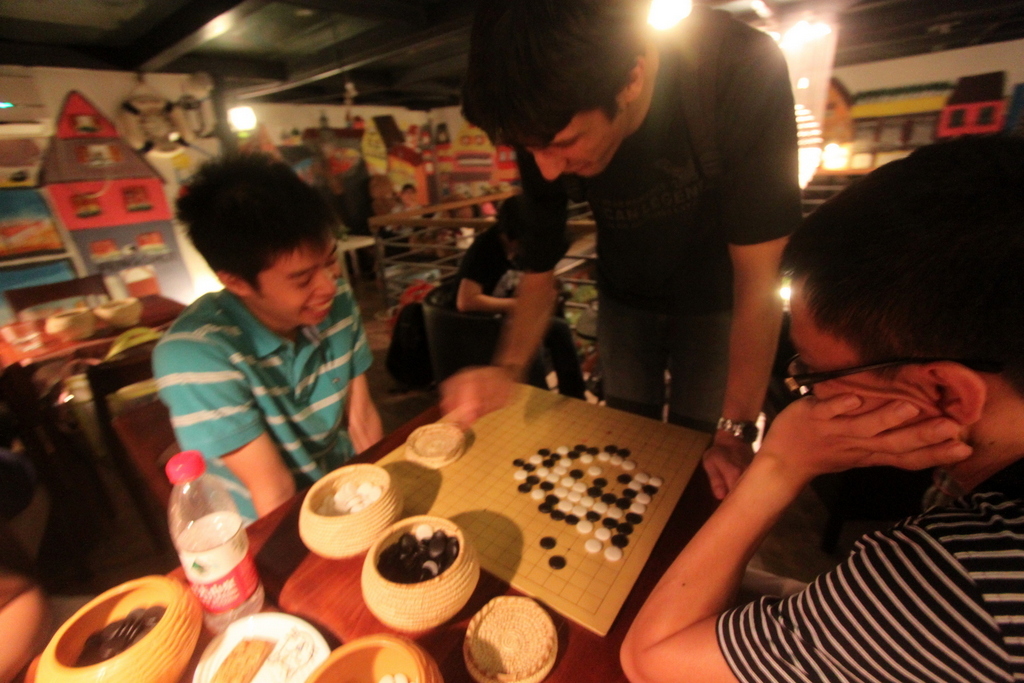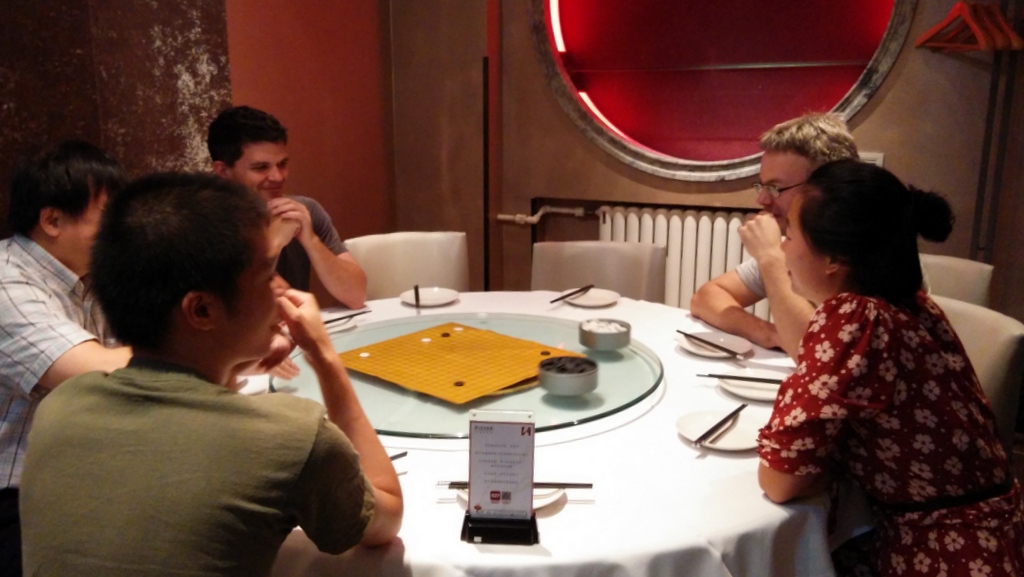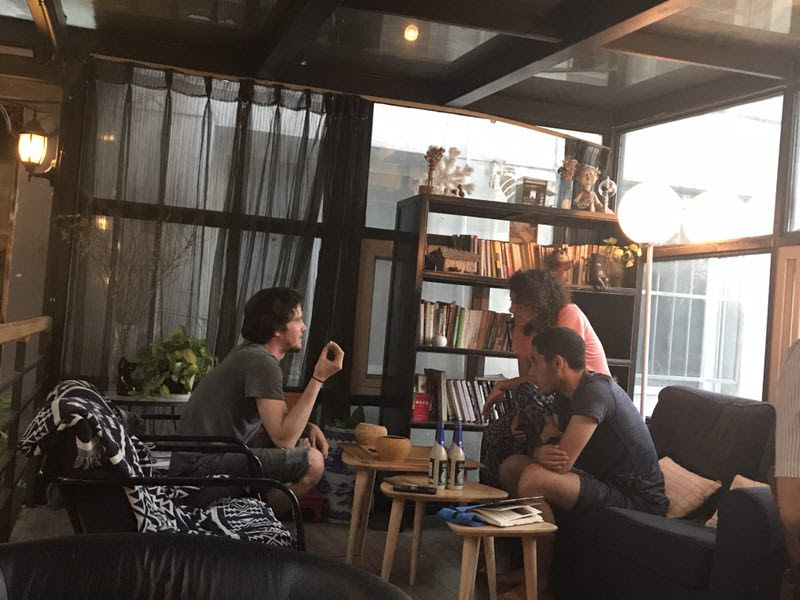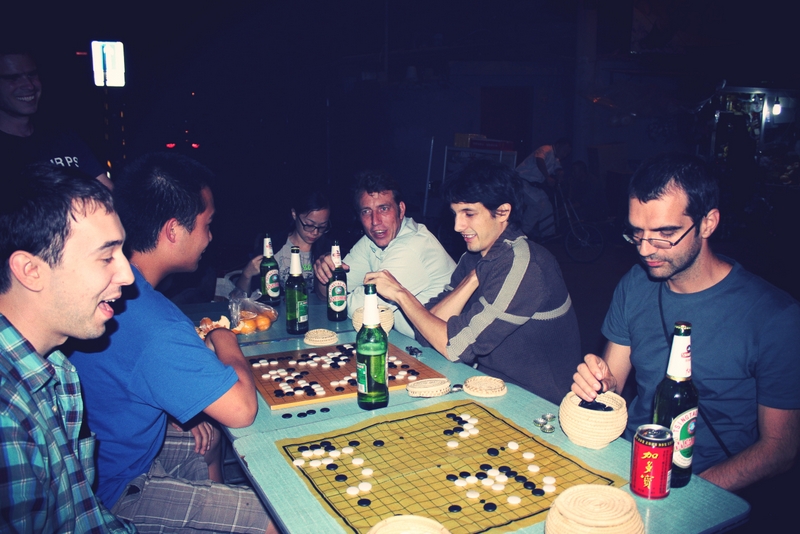Beijing Go Club


When
Every Tuesday
7:30pm - 10:30pm
Active from 2008-2017+
What
We're an amateur go club. We have about 8-10 people every week, about half foreigners and half locals. We play go (aka wei qi, 围棋, baduk, igo). We also teach people how to play, do reviews, and talk about go. Sometimes we also make up go variants, talk about the pro go world, go over games from magazines, and have internal rivalries. Recently, we also started playing in local tournaments, and preparing for those games!
Our regular members rank from beginners, to a big group around 8k-1d KGS, and then 4d, 5d, 8d, and pro. We have a few beginners coming every week - we have teachers to show you the basics, and experienced players to play teaching games. I think it's best for beginners to just match up with each other and play for fun, though.
The club provides boards and stones, and attendance is free. We arrive at around 7:30 and stay until about 10:30 or 11, every Tuesday night, all seasons. Before playing, some people go to get dinner across the street at a hotpot place, or a nearby hunan place, from about 6:30. You're welcome to join that or just come to play later!
我们成员的级别有从初学者到8K-1D KGS,4D,5D,8D ,甚至职业棋手。也有一些初学者每星期都来,因为每次我们都有老师会介绍一些基础知识,还有经验丰富的棋手教你下。当然,最有意思的就是初学者们找到棋友一起切磋,从中享受围棋的种种乐趣。
俱乐部提供围棋盘和棋子,参加活动完全是免费的。每星期二晚上我们从7:30开始下棋一直到10点半或11左右,全年如此。有些人6:30就到了,然后去街对面吃火锅,或者附近的湖南菜 ,非常欢迎你一起来吃, 或是直接来下棋。
地点在“161旅店”里面的咖啡馆,靠近市中心,离地铁 5号线非常近 。咖啡馆既便宜又舒服。
Where
We are trying out some new places - contact Olga or Aaron, or join the wechat group to find this weeks' meeting location.
Contact

The club is organized using a wechat group.
Add either of these people to be added:
- Aaron (wordyartist)
- Olga (Merukaba)
The group isn't high traffic - it's got go problems, discussions of events (getting together to watch alphaGo), taking trips to tournaments, places to play go around the city, etc.
Pictures!

We have all levels - from the strongest who've gained 1 dan level for every 5 years of life, to people who gained 1 kyu level for every year =) (2014)

It's fun to discuss crazy joseki (2014)

One-color go! (2015)

Playing on a spinning table, with an odd number of seats. (Autumn 2014)

An interesting variant - give black the whole border, and W plays first to live. It's really hard to survive. Supposedly it's dead or ko, but can live with 2 moves to start. (2015)

The girls of the club (2017)

We also challenge the locals sometimes (Summer 2014)

Our team playing in the Donghu Cup in Wangjing (Summer 2014)

Sam & Fang return to visit! (2017)

Long days in Beijing summer (2017)

The ultimate problem (eternal)
Donghu cup tournament

Thanks to Karl for organizing it all! (August 2013)

Carl was the only winner against the good Korean team all day!

Playing go outside september 2012

Big hotpot dinner september 2012
Studying Go
If you are a total beginner, you should Download Igowin - it's a little go program you can play go against.
This is a great way to learn the rules and the basic idea, without anybody looking over your shoulder. When you start, just click around til you figure out what's going on. It'll start you with a big advantage. Once the computer passes, click "pass" yourself and it'll score the game. If you keep winning, it'll give you less and less of an advantage.
Playing Online
Check out OGS, which is a browser-based online go server. We have a group there, too: Beijing Go Club OGS group. This server is way better than KGS and has a bunch of new people who are just learning on it, too.
Improving
If you have been playing for a while, and want to seriously get better, I recommend goproblems.com.
Make an account and try the time trials, or just go through the problems. After logging in, click 'problem', 'all unsolved', and with a difficulty of 'at least 25k'. You should be able to blaze through these at first, but keep going. As you have solved more and more, remaining problems will get harder and harder until you find your level. Most problems here have variations showing the continuations, too, which is good for complex problems. You can also add comments with variations you think are wrong or missing. This site can get you all the way from 'just learned the rules' up to very high amateur level. The more effort you put in here, the more you will get back over the board. An interesting thing about people studying to be pro is that they spend more time doing problems, especially life and death problems, than they spend actually playing games.
Techniques
- Be 100% sure you have the right answer to all variations before you play it out
- Don't guess. Try to visualize the stones in your mind
- Diligence will be rewarded. Every single new shape and key point you learn will win you multiple games later.
- Being good at problems will get you sudden wins and resignations, which are fun - save all that boring endgame!
cgoban-h
Here is a local copy of the modified cgoban client called cgoban-h, which has a number of improvements over the official version. (this is a new version, which works with KSG 3.5 (updated january 2012)). This is included here as a demonstration of the great usability improvements possible in the KGS client; however, it's not officially approved by KGS. To try it, right-click and do 'save as' - then, run the file and connect to kgs in the normal way. (on linux, java -jar cgoban-h.jar, once you have java in your path ("which java" has to succeed)). Now that OGS is around, this won't be necessary for much longer.
Update: June 2017 KGS has been sold? Hopefully this is good news for the platform!History!
The Beijing go club was
- Started sometime before 2008 by Greg May (Thanks Greg!)
- Run by Mark Pinner & Ernie from 2008-2009
- Run by Ernie from 2009-2015
- Run by Sam & Fang from 2015-2016
- Run by Aaron and Olga from 2016 to today